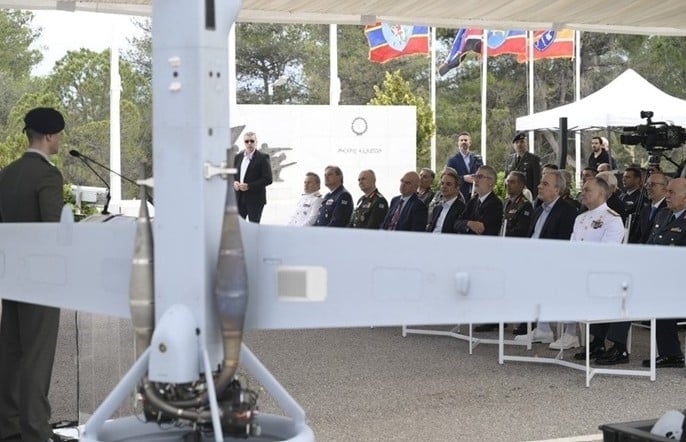

Greece’s Prime Minister Kyriakos Mitsotakis attended a special ceremony marking the induction of V-BAT drones (UAVs) into the country’s Armed Forces—a donation from the Athanassios K. Laskaridis Foundation.
The advanced drones represent a significant leap in technological capability for the military. With high operational flexibility, long autonomy, in-motion handling, and low operating costs, the V-BAT UAVs can operate even under adverse weather conditions and electromagnetic interference, making them especially valuable for modern warfare scenarios.
“What we’re seeing today isn’t science fiction—it’s the real face of the battlefield,” Mitsotakis said, emphasizing the tactical importance of these systems.
The prime minister also praised Panos Laskaridis, highlighting his longstanding support for the Armed Forces, particularly the Hellenic Navy.
Founded in 2015, the Athanassios K. Laskaridis Foundation focuses on key national priorities, including marine protection, employment and entrepreneurship, and strategic national initiatives—such as enhancing Greece’s defense capabilities.
Mitsotakis noted that these donations allow Greece to rapidly integrate and test next-gen technologies, offering a more agile procurement strategy and paving the way for future investments.
“The Armed Forces are undergoing perhaps the most daring transformation since the founding of the modern Greek state,” the Prime Minister said. “Our bold Agenda 2030 isn’t just about acquiring new weapons systems—it’s about rethinking how we approach defense entirely.”
“Agenda 2030,” launched in early April, is a plan to restructure the Armed Forces, emphasizing fighter jet acquisition, Navy Fleet enhancement, and the domestic defense industry’s role in autonomous systems and missile defense.
The agenda aims for the Hellenic Air Force to possess 200 modern 4.5 and 5th-generation aircraft by 2030, gradually phasing out 3rd and 4th-Generation aircraft. Greece plans to acquire two or more full squadrons by the decade’s end, comprised of F-16 Viper, Rafale, and F-35 aircraft.
Part of the plan is the closure of hundreds of superfluous military installations and a reform strategy to revamp the country’s reserve system, with a target of 150,000 active reservists by 2030.
Mitsotakis stressed the importance of embracing innovation, citing the Hellenic Centre for Defence Innovation (HCDI), which facilitates collaboration with Greek defense startups and taps into the country’s top tech talent.
Defense Minister Nikos Dendias echoed the Prime Minister’s vision, noting that the HCDI has already launched four new UAV development programs, with two more expected by year’s end. These initiatives are part of a comprehensive new doctrine designed to reshape Greece’s defense strategy.
“We may be a small country, but that does not mean we should be weak,” Dendias said. “With these reforms, we are clearly on the right path.”
Related: Greece to Ask EU for Fiscal Leeway on Defense Spending
